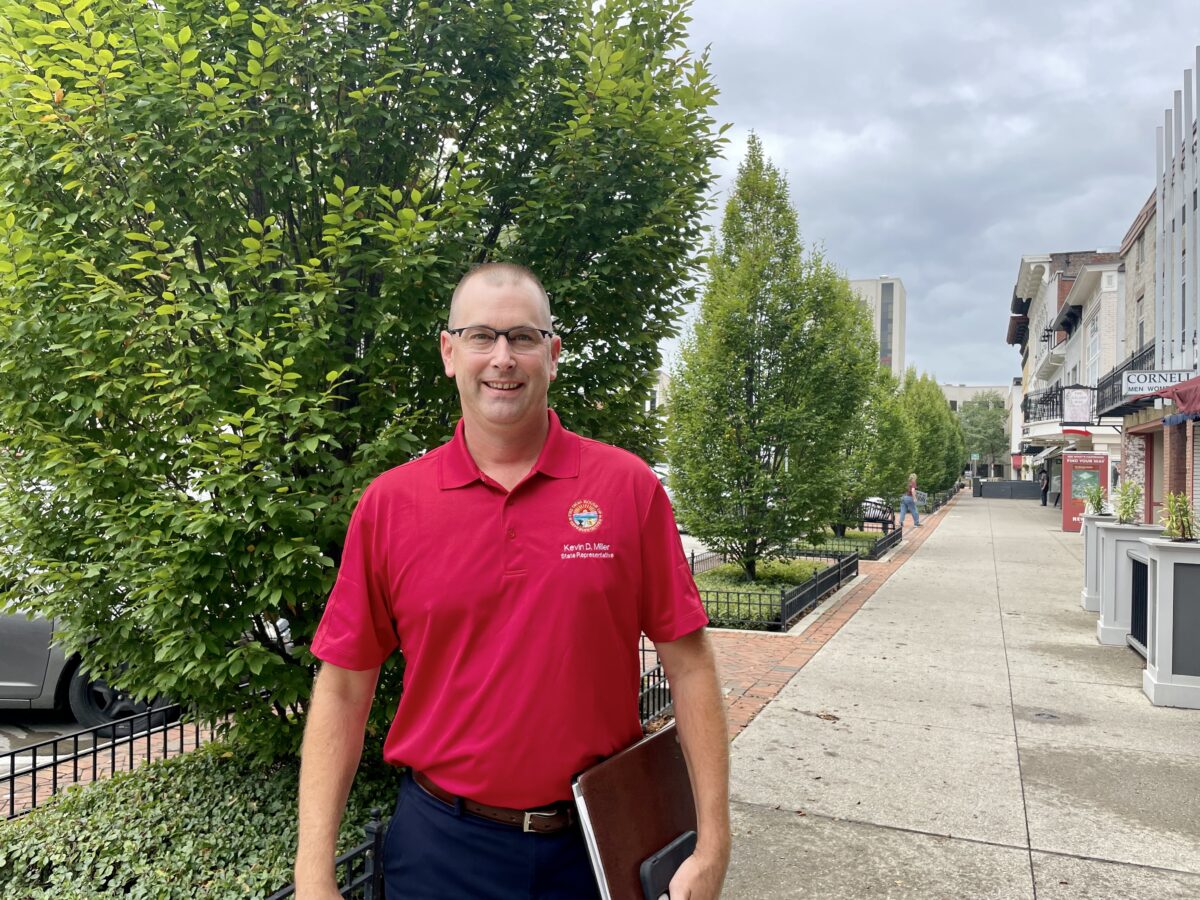Family man and former lawman of over two decades Kevin Miller, 49, is running to maintain his seat in the Ohio House of Representatives, and he won’t let his incumbent status go to his head.
This November, the Newark-based Republican state representative of District 69 — which encompasses parts of Licking, Fairfield and Perry counties — is facing off against Democrat Jamie Hough to maintain his seat.
Miller grew up in Swanton, Ohio where he lived with his three siblings: Brian, Kim and Christie. His mother was formerly a hairdresser, and his father was an automotive worker.
Growing up with a big family quickly introduced Miller to work. Whether he was on his grandfather and neighbor Langenderfer farm hoeing beans, working at Toledo Trap and Skeet, crafting metal at Swanton Welding, or helping out at Sylvester farms, Miller was always in motion.
This led Miller to The Ohio State University, where he studied environmental education, communication and interpretation. His goal was to work for the Department of Natural Resources (DNR) as a game warden, and he attended law enforcement training, obtaining the Ohio Peace Officer certification and National Park Service Ranger certification.
Upon graduation, though, Miller accepted a job with the Ohio State Highway Patrol (OSHP), where he worked for 22 years in a variety of roles, including commander of the Granville Post and the legislative liaison for the OSHP. Now in his role as a state representative, Miller wants to ensure that Ohio legislation gives law enforcement the proper support they need to do their jobs effectively.
“I probably wouldn’t be where I’m at today if it weren’t for that [highway patrol],” said Miller. “One of my top priorities is basically being a [vocal] supporter of not only police, but also our other first responders. That’s really why I’m there.”
Miller was initially appointed to the Ohio House of Representatives in the 72nd district in 2021 after incumbent Rep. Larry Householder was ousted following a bribery and corruption scandal and receiving federal RICO charges.
Miller’s wife Megan encouraged him to interview for the position.
“I was talking with my wife and she said…, ‘Well, why don’t you interview for it? We complain about everything, you’ve got a chance to do something to make a difference,’” Miller said.
And that’s what Miller did, interviewing alongside 18 other candidates.
“So I had to retire from highway patrol,” said Miller. “I raised my hand and they swore me in on the same day.”
Miller represented the 72nd District from June 2021 until December 2022. The Ohio Redistricting Commission adopted new maps for house districts after the 2022 election, and Miller became the representative for the 69th district in January 2023.
He sees the role of law enforcement as fundamental and not political, clearly laid out in his proposed legislation House Bill 100.
“One of the big ones that I really like to see is House Bill 100 which is called the Chief Steven DiSario Act,” said Miller. “And it protects the ‘thin blue line’ flag. Now homeowners associations, condos, and associations cannot prevent the flying of the American flag, the Ohio flag, the Prisoner of War flag and the military flags.”
Steven DiSario had been the Kirkersville Police Chief for just three weeks when he was shot and killed while responding to a hostage situation in 2017. Five years later, his parents — Miller’s constituents — were told they could not fly the ‘thin blue line’ flag to honor their son at their home in Etna. The family was asked to remove the flag by the homeowner’s association, which did not sit right with Miller.
“That is not a political statement,” said Miller. “It represents those that protect and serve us in our communities every day.”
Flying the thin blue line flag — a sign that typically shows support for law enforcement — is not considered protected speech, and remains controversial in the United States, where some police departments have banned the ‘thin blue line’ imagery.
This interaction and proposed bill is indicative of Miller’s goals in the statehouse. He is grateful for the opportunities and values which the highway patrol brought into his life, and he wants to pay that respect forward onto current law enforcement and first responders.
Miller acknowledged the complexity in the law enforcement field as well, and introduced House Bill 333 to the Ohio General Assembly. This bill would prohibit the formal and informal use of arrest quotas for police officers. Eliminating quotas creates a fairer system for officers and civilians where there are no incentives or performance boosters associated with overpolicing.
With the upcoming election, Miller is confident and excited, but will not let that cloud his thinking.
I’m working hard,” said Miller. “I’ve got a lot of support, and I’m feeling good, but you never take anything for granted in this space. So you continue to work hard, and hopefully, your constituents see that you’re working hard and they support you.”
Noah Fishman writes for TheReportingProject.org, the nonprofit news organization of Denison University’s Journalism program, which is supported by generous donations from readers. Sign up for The Reporting Project newsletter here.

